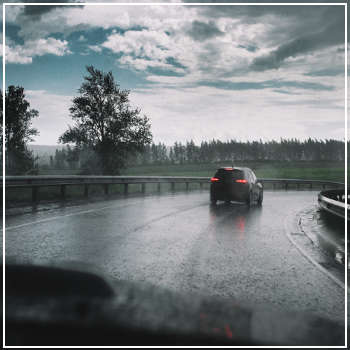While pure rainwater itself isn't harmful, it often carries microscopic particles like dirt, dust, and even pollutants from the atmosphere. These particles settle on your car as the water evaporates, leaving unsightly streaks known as "water marks." If these marks aren’t removed promptly, they can become stubborn stains that dull your car’s finish over time. It’s best to clean your car within a few days after a rainfall to avoid any lasting damage. During seasons when rain is frequent—like spring or summer—it’s crucial to keep your car clean. Dirt and grime can accumulate quickly, especially after multiple storms. Whether you opt for a DIY wash with soap and water or prefer the convenience of a professional car wash, make sure to clean your car every couple of weeks. Additionally, applying a coat of wax or a protective sealant can help safeguard your vehicle’s exterior against future weather-related damage. Acid rain poses a greater risk than regular rain because it contains pollutants such as sulfur dioxide and nitrogen oxides. When acid rain lands on your car, it leaves behind corrosive substances that eat away at the paint and clear coat. Over time, this can result in visible etching or pitting on your vehicle’s surface. If you notice signs of acid rain damage, don’t try to fix it yourself. Instead, consult a professional detailer who can use advanced tools like a dual-action polisher and high-quality buffing pads to restore your car’s shine. In the aftermath of heavy rains or floods, standing water can infiltrate your car’s interior and engine bay. If water enters critical components like the engine, transmission, or fuel system, it can lead to costly repairs or replacements. Similarly, contaminated fluids such as oil, brake fluid, or power steering fluid can compromise your car’s performance. Always have your vehicle thoroughly inspected by a mechanic after flooding, especially if your oil or other fluids appear cloudy or diluted. At DaSilva’s Auto Body, we specialize in restoring both the aesthetics and functionality of vehicles affected by harsh weather conditions. From minor touch-ups to comprehensive repairs, our team provides reliable service at competitive prices. If you’re due for a wash, detailing session, or full restoration, don’t hesitate to contact our Naugatuck location today to schedule an appointment. Your car deserves the best care possible! Polyvinyl alcohol resin (PVA) series products are white solid, with three shapes: flocculent, granular and powdery; It is non-toxic, tasteless and pollution-free. It can be dissolved in 80-90 ℃ water. Its aqueous solution has good adhesion and film formation; Resistant to most organic solvents such as oils, lubricants and hydrocarbons; It has chemical properties such as esterification, etherification and acetalization of long-chain polyols. Pva Resin,Pva 24-88,Polyvinyl Alcohol Pva,Pva 2488 Polyvinyl Alcohol Henan Chuange Industry CO.,LTD , https://www.chuangegroup.com It’s a common misconception that rain will naturally clean your car by washing away dirt and grime. But depending on the type of precipitation, rain can actually cause more harm than good. Here's why you should pay attention to these factors.
It’s a common misconception that rain will naturally clean your car by washing away dirt and grime. But depending on the type of precipitation, rain can actually cause more harm than good. Here's why you should pay attention to these factors.1. Rain Isn’t Just Pure Water
2. Regular Cleaning Prevents Buildup
3. Acid Rain Poses a Bigger Threat
4. Floodwaters Can Damage Internal Components
It is mainly used in warp sizing, fabric finishing agent and vinylon fiber raw materials in textile industry; 107 adhesives, interior and exterior wall coatings and adhesives in construction and decoration industry; Used as polymerization emulsifier, dispersant and polyvinyl formal, acetaldehyde and butyraldehyde resin in chemical industry; Used as paper adhesive in paper industry; In agriculture, it is used as soil conditioner, pesticide adhesion synergist and polyvinyl alcohol film; It can also be used in daily cosmetics and high-frequency quenchants.